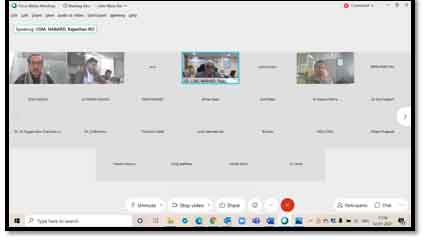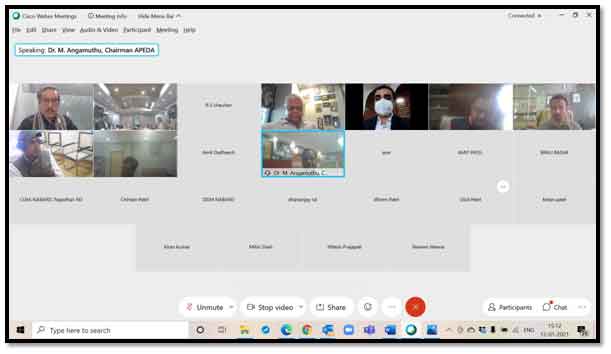GAP, Processing & Value Addition of Isabgol (Psyllium)
12 January 2021
The Hadoti region of South-East Rajasthan and Guna district of Madhya Pradesh are endowed with Coriander (Coriandrum sativum L.) - the world of coriander in India. Coriander seed spices contains aromatic and medicinal properties and often used as a flavor to different cuisines. Green leaves and seeds are the two distinct segments of coriander production in India. While the green leaves cater to the domestic market, the coriander seed is a major constituent in export basket of seed spices from India.
“Isabgol” also known as Psyllium is an important industrial crop with multiple usages varying from therapeutics uses, industrial application and animal feed. High mucilage content of psyllium seeds makes it the true dietary fibre. Rajasthan accounts half of India’s isabgol production of 1,35,000 tons grown over ~36,000 hectares. Barmer, Jaiselmer, Jalore and Nagaur are major isabgol producing districts in Rajasthan.
Psyllium husk, an actual coating of mucilage around the seed is an exceedingly high value product which is produced by mechanical process. Psyllium powder is the final product obtained after crushing and processing the psyllium husk. The high value psyllium husk and powder yield remarkably high value to processors and businesses engaged in processing of psyllium seeds. Gujarat is a leading State in processing of psyllium seeds into psyllium husk and powder and thus enjoys the actual value of the entire supply chain of isabgol business. In this context, Rajasthan being a major producer of raw isabgol must create an enabling policy environment, designate isabgol cluster and encourage entrepreneurs to set up processing plants for harnessing actual value of isabgol production, processing and value addition. In the existing supply chain of isabgol, Rajasthan is at disadvantage in the absence of a major cluster for processing of isabgol in Rajasthan
As per industry estimates, almost all isabgol production at 1,35,000 tons is processed to produce psyllium husk and powder. India is estimated to produce ~30,000 tons of psyllium husk every year. The conversion ratio of isabgol seeds to psyllium husk is about 0.25, thus makes it an exceedingly high value crop. A ton of isabgol seeds yields 250 kg of psyllium husk after de-husking and milling processes. Notably, the psyllium husk is sold at 20-25 times the market price of Isabgol seeds. The other by-product Gola and Lali is used for cattle feed where as Khakha is used in food industry including icecream, biscuits and candies. Due to multiple usages in dietary supplements, pharmaceutical, animal feed, and others, it is estimated that the market for whole, powder, and dust is bound to grow manifolds, and Indian psyllium would continue to dominate the global psyllium market. However, the country needs to strengthen its production system, deploy good agricultural practices & IPM based production module and training of farmers to ensure quality and residue free or low residue presence in isabgol production.
The psyllium webinar is an opportunity to engage with diverse stakeholders to deliberate on ways and means to increase processing of isabgol in Rajasthan in order to optimize value creation for growers and processors. In 2020, the APEDA and RSAMB have agreed to setup Isabgol cluster in Rajasthan to accelerate formation of FPO based aggregation, infrastructure and processing facilities of isabgol in Rajasthan. Training of farmers to produce quality and residue free isabgol, setting up FPOs for aggregation and processing infrastructure at cluster and education consumer about the health benefits of isabgol.
 DBT-SABC Biotech Kisan
Hub, Department of
Biotechnology: Govt. of India
in collaboration with the
Agricultural and Processed
Food Products Export
Development Authority
(APEDA), South Asia
Biotechnology Centre and
ICAR-DMAPR, Department
of Agriculture and RSAMB,
Government of Rajasthan organized a webinar on “Good Agricultural Practice (GAP),
Processing and Value Addition of Isabgol (Psyllium)” on 12 January 2021.
DBT-SABC Biotech Kisan
Hub, Department of
Biotechnology: Govt. of India
in collaboration with the
Agricultural and Processed
Food Products Export
Development Authority
(APEDA), South Asia
Biotechnology Centre and
ICAR-DMAPR, Department
of Agriculture and RSAMB,
Government of Rajasthan organized a webinar on “Good Agricultural Practice (GAP),
Processing and Value Addition of Isabgol (Psyllium)” on 12 January 2021.
 DBT-SABC Biotech Kisan
Hub, Department of
Biotechnology: Govt. of India
in collaboration with the
Agricultural and Processed
Food Products Export
Development Authority
(APEDA), South Asia
Biotechnology Centre and
ICAR-DMAPR, Department
of Agriculture and RSAMB,
Government of Rajasthan organized a webinar on “Good Agricultural Practice (GAP),
Processing and Value Addition of Isabgol (Psyllium)” on 12 January 2021.
DBT-SABC Biotech Kisan
Hub, Department of
Biotechnology: Govt. of India
in collaboration with the
Agricultural and Processed
Food Products Export
Development Authority
(APEDA), South Asia
Biotechnology Centre and
ICAR-DMAPR, Department
of Agriculture and RSAMB,
Government of Rajasthan organized a webinar on “Good Agricultural Practice (GAP),
Processing and Value Addition of Isabgol (Psyllium)” on 12 January 2021.
Dr. Om Prakash (IAS) Commissioner of Agriculture and Horticulture, Government of Rajasthan in his special address expressed that isabgol is a sensitive crop and gets damaged in dew or rain during harvesting period. There is a need to develop varieties of isabgol resilient to adverse weather conditions, improved seed to husk percentage and high productivity so that industry can get more processed products. Ironically, most of the isabgol production from Rajasthan is transported and processed in Gujarat, and therefore there is a need to increase numbers of processing units, currently around 8-10 in Rajasthan, so as to reduce cost and improve farmers’ realization. While emphasizing the initiatives taken by the Government of Rajasthan through State Agri Export policy, Dr Om Prakash encouraged the progressive farmers and entrepreneurs to opt for incentives and subsidies to increase processing of isabgol close to the production centres in Rajasthan.
 The program was further addressed by Dr. Satyajit Roy, Director, ICAR-Directorate of Medicinal Aromatic Plants Research (DMAPR), Anand, Gujarat who highlighted the multiple usages of isabgol and its by-products. Dr Roy presented the R&D of isabgol including genetic resources management, registration of germplasm, breeding of improved varieties, preparation of seed standard manual and supply of quality seeds. He also highlighted the importance of breeding downy mildew resistance and establishment of an off-season nursery for shuttle breeding.
The program was further addressed by Dr. Satyajit Roy, Director, ICAR-Directorate of Medicinal Aromatic Plants Research (DMAPR), Anand, Gujarat who highlighted the multiple usages of isabgol and its by-products. Dr Roy presented the R&D of isabgol including genetic resources management, registration of germplasm, breeding of improved varieties, preparation of seed standard manual and supply of quality seeds. He also highlighted the importance of breeding downy mildew resistance and establishment of an off-season nursery for shuttle breeding.
Dr CD Mayee, President South Asia Biotechnology Centre and DBT-SABC Biotech Kisan Hub for Western Dry Region informed the participants about the activities including demonstrations and farmers training programs undertaken by DBT-SABC Biotech hub in promotion of GAP and IPM isabgol in Western Rajasthan. He has invited different agencies and institutions to join hands with DBT-SABC biotech kisan hub to increase supply of good quality seeds, increase seed replacement rate (SRR) and IPM based production system of isabgol in Rajasthan.
 While making an exhaustive presentation, Dr. R. Nagaraja Reddy, scientist, ICAR-DMAPR pointed out the use of isabgol and isabgol seed husk properties for the health benefits. Dr Reddy highlighted the work carried out by ICAER-DMAPR on isabgol including development of high yielding varieties, promotion of good agriculture practices, genetic resource management, seed standard for quality assurance, DUS testing guideline for plant variety protection, quality and seed production supply to a farmer for cultivation. He also raised pertinent issues with isabgol cultivation like climate-sensitive crop, good agriculture practices, volatile market price, and Pyrrolizidine alkaloids (PA) residues in the husk. Dr Reddy also shared his strategy to increase demand for isabgol cultivation by popularization of isabgol through campaigns, value addition and introduction of isabgol in the public distribution system (PDS) along with nutria-cereals.
While making an exhaustive presentation, Dr. R. Nagaraja Reddy, scientist, ICAR-DMAPR pointed out the use of isabgol and isabgol seed husk properties for the health benefits. Dr Reddy highlighted the work carried out by ICAER-DMAPR on isabgol including development of high yielding varieties, promotion of good agriculture practices, genetic resource management, seed standard for quality assurance, DUS testing guideline for plant variety protection, quality and seed production supply to a farmer for cultivation. He also raised pertinent issues with isabgol cultivation like climate-sensitive crop, good agriculture practices, volatile market price, and Pyrrolizidine alkaloids (PA) residues in the husk. Dr Reddy also shared his strategy to increase demand for isabgol cultivation by popularization of isabgol through campaigns, value addition and introduction of isabgol in the public distribution system (PDS) along with nutria-cereals.
 Sh Man Prakash Vijay, AGM, APEDA, MOC&I, Govt of India shared his views and insights prepared jointly by APEDA and RSAMB of the Government of Rajasthan on Isabgol cluster, SWOT analysis and prospects of export of isabgol. He elaborated on the various policies and schemes of APEDA and Government of Rajasthan to spur growth in processing and export of isabgol from India. He also informed the participants that isabgol is assigned to Jalore district under ODOP of the PMFME, and therefore the cluster development program should be taken on priority basis. A detailed presentation was made by APEDA and RSAMB on its activities and showing the international trade, domestic production and share of Rajasthan in production isabgol, financial assistance schemes for development of agro processing industries and export in Rajasthan.
Sh Man Prakash Vijay, AGM, APEDA, MOC&I, Govt of India shared his views and insights prepared jointly by APEDA and RSAMB of the Government of Rajasthan on Isabgol cluster, SWOT analysis and prospects of export of isabgol. He elaborated on the various policies and schemes of APEDA and Government of Rajasthan to spur growth in processing and export of isabgol from India. He also informed the participants that isabgol is assigned to Jalore district under ODOP of the PMFME, and therefore the cluster development program should be taken on priority basis. A detailed presentation was made by APEDA and RSAMB on its activities and showing the international trade, domestic production and share of Rajasthan in production isabgol, financial assistance schemes for development of agro processing industries and export in Rajasthan.
 Dr. Bhagirath Choudhary, DBT-SABC Biotech Kisan Hub, South Asia Biotechnology Centre, Jodhpur & Board Member, APEDA recounted the field experience in the implementation of DBT-SABC Biotech Kisan hub to strengthen production of isabgol & improving market access. He emphasized on IPM technology of isabgol and shared his deep insights into farmers field demonstration, pressed on GAP and IPM paradigm and promotion of IPM and biopesticides which would help to minimize the pesticide residue, and hence increase price realization for farmers.
Dr. Bhagirath Choudhary, DBT-SABC Biotech Kisan Hub, South Asia Biotechnology Centre, Jodhpur & Board Member, APEDA recounted the field experience in the implementation of DBT-SABC Biotech Kisan hub to strengthen production of isabgol & improving market access. He emphasized on IPM technology of isabgol and shared his deep insights into farmers field demonstration, pressed on GAP and IPM paradigm and promotion of IPM and biopesticides which would help to minimize the pesticide residue, and hence increase price realization for farmers.
 While focusing of FPO based aggregation and value addition of Isabgol, Shri Jaideep Srivastava, Chief General Manager, NABARD, Jaipur stressed on need to explore the possibilities of registering isabgol under the Geographical Indications of Goods (Registration and Protection) Act, 1999. Sh Srivastava also narrated efforts of formation and promotion of FPO and need to form sizable numbers of FPOs in Rajasthan. He also stated that there is a need to link FPOs with processors, promote organic produce export zones and export-oriented units to increase employment opportunities for the youth.
While focusing of FPO based aggregation and value addition of Isabgol, Shri Jaideep Srivastava, Chief General Manager, NABARD, Jaipur stressed on need to explore the possibilities of registering isabgol under the Geographical Indications of Goods (Registration and Protection) Act, 1999. Sh Srivastava also narrated efforts of formation and promotion of FPO and need to form sizable numbers of FPOs in Rajasthan. He also stated that there is a need to link FPOs with processors, promote organic produce export zones and export-oriented units to increase employment opportunities for the youth.
Dr Sudhanshu, Secretary, APEDA, Ministry of Commerce and Industry, Govt of India invited participants to mobilize farmers to enrol under APEDA’s farmers connect portal to strengthen supply chain and bridge the gap between farmers and exporters.
The major issues emerged during the webinar are:
The webinar was organized successfully with the participation of more than 70 persons from various Central / state govt departments, DBT-SABC, NABARD, SFAC, isabgol processors association, industries and exporters.
Necessary action will be initiated on each point emerged for required interventions for strengthening the supply chain of exporters of isabgol products from Rajasthan.
For more information, please contact Sh Man Prakash Vijay of APEDA at mpvijay@apeda.gov.in or Dr Sandip Agale of South Asia Biotechnology Centre: sandip@sabc.asia